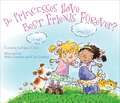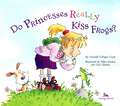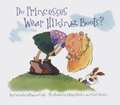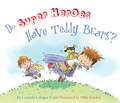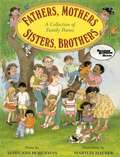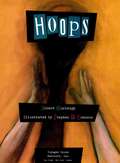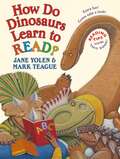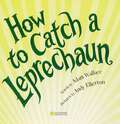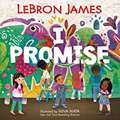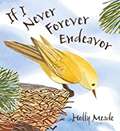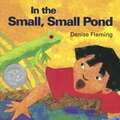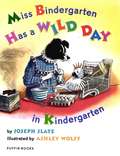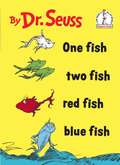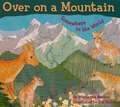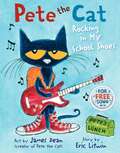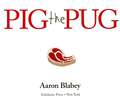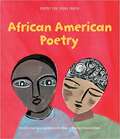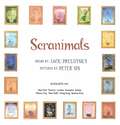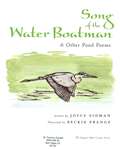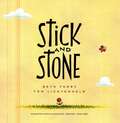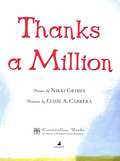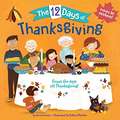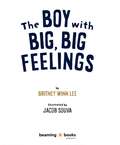- Table View
- List View
Do Princesses Have Best Friends Forever
by Carmela LaVigna CoyleYour favorite princess has met her match! Join in the fun as two little girls celebrate their friendship by playing dress up, making forts, stomping in the mud, and generally doing all the things that best friends do. Together they learn that being a princess is about more than just crowns and dress up. It's about being yourself and sharing that with a friend.
Do Princesses Really Kiss Frogs (Do Princesses Ser.)
by Carmela LaVigna CoyleA young girl takes a hike with her father, asking many questions along the way about what princesses do.
Do Princesses Wear Hiking Boots (G - Reference,information And Interdisciplinary Subjects Ser.)
by Carmela LaVigna CoyleWhen a little girl asks her mother about princesses, she learns that they are much like herself.
Do Super Heroes Have Teddy Bears
by Carmela LaVigna CoyleYoung readers can follow along as two ragtag, everyday super heroes don capes to play in the mud, save their stuffed animals from certain peril, conquer the vegetables at dinner, and overcome darkness at night.
Fathers, Mothers, Sisters, Brothers A Collection of Family Poems
by Mary Ann HobermanHumorous and serious poems celebrate every kind of family member, including mothers and fathers, aunts and uncles, stepbrothers, stepsisters, and cousins.
Hoops
by Robert BurleighIllustrations and poetic text describe the movement and feel of the game of basketball.
How Do Dinosaurs Learn to Read
by Jane YolenAmerica's favorite dinosaurs romp and roar as they soak books in the bathtub, throw them, and finally learn how to carefully read them... with Mama and Papa at bedtime. Get ready to laugh at this lighthearted, heartwarming, and funny approach to books! Children sometimes feel the task of learning to read is overwhelming, but the winning combination of rhyme and illustrations here provide a perfect way to present the subject in a comical, engaging, and nonjudgmental way. The contrast of enormous dinosaurs in kid-sized bedrooms (with human parents) adds irresistible humor as families explore the do's and don'ts of reading. Both practical and engaging, this book shows dinosaurs getting into all sorts of reading-related trouble! But of course, in the end, the dinosaurs learn how to carefully handle their books, read out loud, and read a lot!
How to Catch a Leprechaun (How To Catch Ser.)
by Adam WallaceYou've been planning night and day, and finally you've created the perfect trap with shamrocks, pots of gold, and rainbows galore! Now all you need to do is wait. Is this the year you'll finally catch the leprechaun? Start a St. Patrick's Day tradition with this fun and lively children's picture book and get inspired to build leprechaun traps of your own at home or in the classroom! Laugh along in this zany story for kids that blends STEAM concepts with hilarious rhymes and vibrant illustrations!
I Promise
by LeBron JamesA set of promises are made in this book which help in setting goals and working hard in order to achieve success.
If I Never Forever Endeavor
by Holly MeadeSafe inside his cozy nest, a young bird considers whether or not to give his new wings a try. What if he tries and the wings don’t work, and he flails, plummets, and looks foolish? Then again, what if his wings take him swooping and gliding, sailing and flying through a great big wonderful world? He’ll never know if he never endeavors. With the help of her bold, beautiful collage artwork, Caldecott Honor-winning artist Holly Meade offers a gentle nudge for hesitant fledglings of all ages and species to step out, to dare, to try . . . and to fly.
In the Small Small Pond
by Denise FlemingIllustrations and rhyming text describe the activities of animals living in and near a small pond as spring progresses to autumn.
Miss Bindergarten Has a Wild Day in Kindergarten (Miss Bindergarten Bks.)
by Joseph SlateThings are always a little rowdy in a class of twenty-six kindergartners, but there are some days when chaos reigns. Watch what happens in Miss Bindergarten's rambunctious class when water overflows, ants are on the loose, and oozy paint smudges. How will Miss Bindergarten and the kindergartners get everything back in order? This is one kindergarten adventure not to be missed!
One Fish, Two Fish, Red Fish, Blue Fish
by Dr Seuss"This one, I think, is called a Yink. He likes to wink, he likes to drink. He likes to drink, and drink, and drink. The thing he likes to drink is ink. The ink he likes to drink is pink. He likes to wink and drink pink ink."
Over on a mountain: Somewhere In The World (Over- Dawn Pub Ser.)
by Marianne BerkesA counting book in rhyme that presents various animals and their offspring that dwell in high mountain environments, from a mother llama and her "little cria one to an emperor penguin, his hen, and their "little chicks ten." Includes related facts and activities.
Pete the Cat Rocking in My School Shoes: A Back To School Book For Kids (Pete The Cat Ser.)
by Eric LitwinPete the cat wears his school shoes while visiting the library, the lunchroom, the playground, and more while singing his special song.
Pig the Pug (Pig The Pug Ser.)
by Aaron BlabeyPig is a selfish pug who does not want to share his toys with his canine housemate, Trevor - until an accident teaches him the value of friendship.
Poetry for Young People: African American Poetry (Poetry For Young People Ser.)
by Arnold Rampersad Marcellus BlountThe newest addition to the acclaimed Poetry for Young People series shines a light on the power and beauty of African-American verse. Co-editors Arnold Rampersad and Marcellus Blount--both towering figures in literary criticism--have put together an impressive anthology that will open up a world of wonderful word images for children. Helpful and generous annotations, a lively introduction, and beautiful illustrations by Karen Barbour make this the ideal book to introduce young readers to the marvels of poetry.
Scranimals
by Jack PrelutskyJack Prelutsky takes the reader on a journey to Scranimal Island where the most intriguing variety of mixed up animal-vegetable-plants live. The fun and nonsensical combination of unbelievable matches, with just enough recognizable traits from their name, send the imagination on a wild goose chase to discover what else might be found on Scranimal Island.
Soccer Hour
by Carol NeviusSoccer practice begins, and the players stretch, warm up, and work on their footwork, juggling, goal shooting, and keep-away skills before splitting into two teams for an exciting scrimmage. Bill Thomson’s dramatic perspectives and Carol Nevius’ accomplished text demonstrate the training and teamwork that build strong players.
Somewhere in the Ocean
by Jennifer Ward T. J. MarshA counting book in rhyme presents various marine animals and their children, from a mother manatee and her little calf one to a mother octopus and her little babies ten. Complete with a glossary, musical score, and numbers hidden in the illustrations.
Song of the Water Boatman And Other Pond Poems: A Caldecott Honor Award Winner
by Joyce SidmanA collection of poems that provide a look at some of the animals, insects, and plants that are found in ponds, with accompanying information about each.
Stick and Stone (Stick And Stone Ser.)
by Beth FerryStick and Stone form a friendship till Stick is blown away in a storm and Stone goes to find him.
The 12 Days of Thanksgiving (The 12 Days of Series)
by Jenna Lettice"On the first day of Thanksiving, I was thankful for..." This festive story starts with ONE cozy evening at home with family, then adds TWO sacks of apples, and THREE fall squash, counting up through the twelve days leading to Thanksgiving. Kids will love spotting all the fun ways a family gets ready for Thanksgiving. And the book includes stickers—perfect treats for each of the 12 days.
The Boy with Big, Big Feelings (The Big, Big Series)
by Britney Winn Lee“Meet a boy with a heart so big, his feelings glow from his cheeks, spill out of his eyes, and jump up and down on his chest. What good is this giant heart?"
